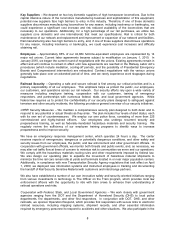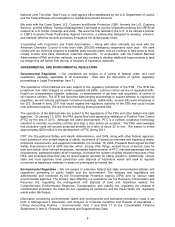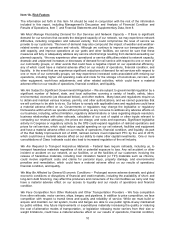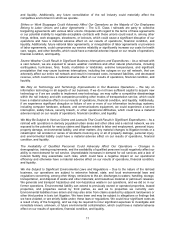Union Pacific 2010 Annual Report Download - page 18
Download and view the complete annual report
Please find page 18 of the 2010 Union Pacific annual report below. You can navigate through the pages in the report by either clicking on the pages listed below, or by using the keyword search tool below to find specific information within the annual report.18
The Railroad is awaiting a decision on its motion for Summary Judgment from the Nebraska court. The
Railroad also filed motions in California, Texas, and Arizona to transfer (to Nebraska), dismiss or stay the
cases in those courts. The California and Texas courts granted UP’s motion to transfer venue to
Nebraska. The Arizona Court has not issued a ruling.
During the third quarter of 2010, CBP notified the Railroad of additional penalties for drug discoveries.
Since then, the Railroad received additional penalties for other drug discoveries. The total outstanding
penalty amount as of December 31, 2010, was approximately $376 million. Because the Railroad
believes that CBP lacks statutory authority to issue these fines, the Railroad will vigorously defend
against these penalties. The Railroad also is participating in high-level discussions with the
Commissioner of CBP to address the fines and seizures. Therefore, we currently believe that these
matters will not have a material adverse effect on any of our results of operations, financial condition, and
liquidity.
Antitrust Litigation – As we reported in our Quarterly Report on Form 10-Q for the quarter ended June
30, 2007, 20 small rail shippers (many of whom are represented by the same law firms) filed virtually
identical antitrust lawsuits in various federal district courts against us and four other Class I railroads in
the U.S. The original plaintiff filed the first of these claims in the U.S. District Court in New Jersey on May
14, 2007, and the additional plaintiffs filed claims in district courts in various states, including Florida,
Illinois, Alabama, Pennsylvania, and the District of Columbia. These suits allege that the named railroads
engaged in price-fixing by establishing common fuel surcharges for certain rail traffic.
We received additional complaints following the initial claim, increasing the total number of complaints to
30. In addition to suits filed by direct purchasers of rail transportation, a few of the suits involve plaintiffs
alleging that they are or were indirect purchasers of rail transportation and seek to represent a purported
class of indirect purchasers of rail transportation that paid fuel surcharges. These complaints added
allegations under state antitrust and consumer protection laws. On November 6, 2007, the Judicial Panel
on Multidistrict Litigation ordered that all of the rail fuel surcharge cases be transferred to Judge Paul
Friedman of the U.S. District Court in the District of Columbia for coordinated or consolidated pretrial
proceedings. Subsequently, the direct purchaser plaintiffs and the indirect purchaser plaintiffs filed
Consolidated Amended Class Action Complaints against UPRR and three other Class I railroads.
One additional shipper filed a separate antitrust suit during 2008. Subsequently, the shipper voluntarily
dismissed the action without prejudice.
On October 10, 2008, Judge Friedman heard oral arguments with respect to the defendant railroads’
motions to dismiss. In a ruling on November 7, 2008, Judge Friedman denied the motion with respect to
the direct purchasers’ complaint, and pretrial proceedings are underway in that case. On December 31,
2008, Judge Friedman ruled that the allegations of the indirect purchasers based upon state antitrust,
consumer protection, and unjust enrichment laws must be dismissed. He also ruled, however, that the
plaintiffs could proceed with their claim for injunctive relief under the federal antitrust laws, which is
identical to a claim by the direct purchaser plaintiffs.
The indirect purchasers appealed Judge Friedman's ruling to the U.S. Court of Appeals for the District of
Columbia. On April 16, 2010, the U.S. Court of Appeals for the District of Columbia affirmed Judge
Friedman’s ruling dismissing the indirect purchasers’ claims based on various state laws. On June 8,
2010, the court rejected the indirect purchasers’ requests for a rehearing of their appeal and a hearing en
banc by the entire court. On September 8, 2010, the indirect purchaser plaintiffs filed a Petition for
Certiorari with the U.S. Supreme Court. The railroad defendants filed their response on November 9,
2010, urging the Court not to review the lower courts' decisions. On December 13, 2010, the U.S.
Supreme Court denied the indirect purchaser plaintiffs’ Petition for Certiorari.
The direct purchaser plaintiffs filed their motion for class certification on March 18, 2010. The railroad
defendants filed their opposition to this motion on July 1, 2010. Judge Friedman conducted a hearing on
October 6 and 7, 2010, on the class certification issue and has yet to issue a decision.
We deny the allegations that our fuel surcharge programs violate the antitrust laws or any other laws. We
believe that these lawsuits are without merit, and we will vigorously defend our actions. Therefore, we
currently believe that these matters will not have a material adverse effect on any of our results of
operations, financial condition, and liquidity.
























